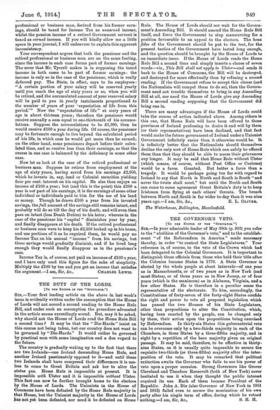THE GOVERNOR'S VETO.
[To Tall EDFFOI OF TH1 .SPNOTAT03."1 Six,—In your admirable leader of May 30th (p. 903) you refer to the "abolition of the Governor's veto," and to the establish- ment "of the Referendum in America" made necessary thereby, in order "to control the State Legislatures." Your reference is, of course, to the veto of the Crown which had been delegated to the Colonial Governors. It is important to distinguish these officials from those who held their title after the Colonies became States in 1776. A State Governor is elected by the whole people at short intervals—of one year as in Massachusetts, or of two years as in New York (and most States), or of three years as in New Jersey, or of four years (which is the maximum) as in Alabama, Virginia, and a few other States. He is therefore in a peculiar sense the representative of the electorate. To him, accordingly, the Constitutions of forty-seven of the forty-eight States confide the right and power to veto all proposed legislation which has passed the two Houses of his State Legislature, other than propositions to alter the Constitution, which, having been enacted by the people, can be changed only by them, their action upon the propositions being exercised by Referendum. In thirty-six States this gubernatorial veto can be overcome only by a two-thirds majority in each of the Chambers, in three States by a three-fifths majority, and in eight by a repetition of the bare majority given on original passage. It may be said, therefore, to be effective in thirty- nine States, as it is usually quite impossible to secure the requisite two-thirds (or three-fifths) majority after the inter- position of the veto. It may be remarked that political extinction awaits the Governor who fails to use his power of veto upon a proper occasion. Strong Governors like Grover Cleveland and Theodore Roosevelt (both of New York) never hesitated to use it when they thought the public interest required its use. Each of them became President of the Republic. John A. Dix (also Governor of New York in 1911 and 1912) failed even to secure the nomination of his own party after his single term of office, during which he vetoed










































 Previous page
Previous page